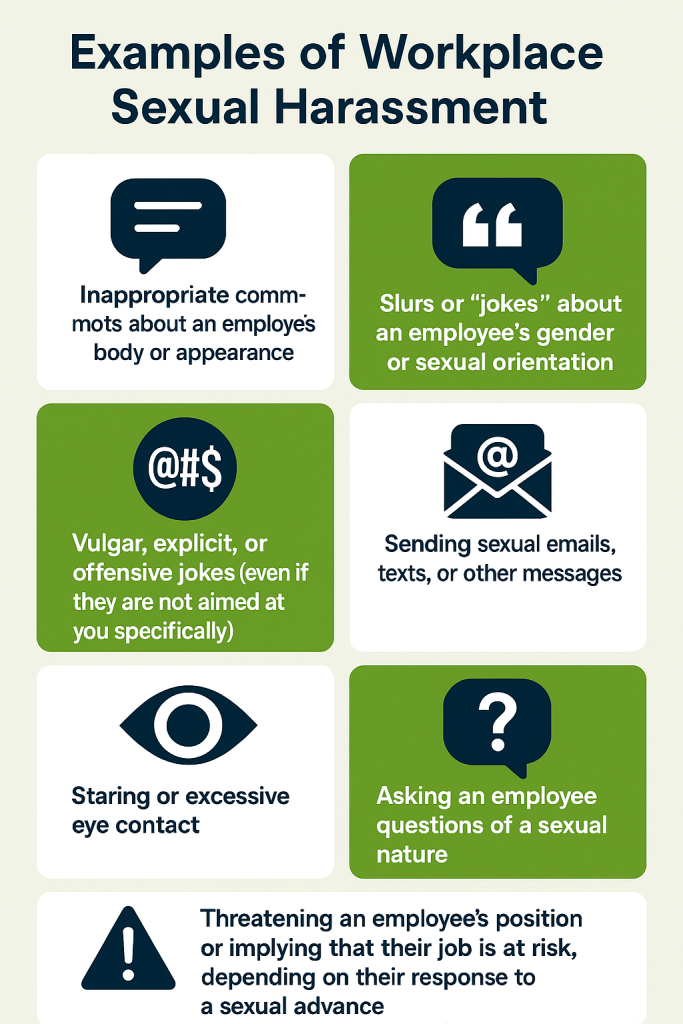Workplace sexual harassment of employees is an awful and unfortunately commonplace situation that can damage people in many ways. An Equal Employment Opportunity Commission (EEOC) study found that anywhere from 25-85% of women have experienced sexual harassment in the workplace. For a variety of reasons, that study also found that 75% of workplace harassment incidents go unreported.
Workplace sexual harassment certainly did not vanish when many jobs went remote at the onset of the Covid pandemic (as we note below, messages and emails can also constitute sexual harassment). However, the lack of physical proximity has limited some forms of harassment. With many employees returning to in-person working environments, we thought it would be an appropriate time to discuss this topic and what employees should know to help protect themselves.
Workplace sexual harassment can include (but isn’t limited to) the following:
- Inappropriate comments about an employee’s body or appearance
- Slurs or “jokes” about an employee’s gender or sexual orientation
- Vulgar, explicit, or offensive jokes (even if they are not aimed at you specifically)
- Sending sexual emails, texts, or other messages
- Staring or excessive eye contact
- Asking an employee questions of a sexual nature
- Threatening an employee’s position or implying that their job is at risk, depending on their response to a sexual advance
One of the most important things to reiterate when it comes to workplace sexual harassment is that what counts as sexual harassment is not determined by the intentions of the person committing the harassment. What matters is what the person who is being harassed thinks and/or feels.
It is also essential to remember that harassment in the workplace does not have to come from an employee’s supervisor or co-workers. An employer is obligated to protect their employees from sexual harassment that comes from a customer, client, or vendor. In these cases, it is critical that the employee dealing with the sexual harassment promptly report the incident through the appropriate internal channels. You can find more information on our subject matter page for these topics.
Protections against workplace sexual harassment vary from state-to-state. There is a federal law, Title VII, that covers the entire nation. However, this law does not protect independent contractors, unpaid volunteers, or employees who work for companies with less than 15 total employees.
Around 2/3 of states have some sort of additional laws that further define workplace sexual harassment and provide recourse for employees who have dealt with this matter at work. Unfortunately, that leaves millions of employees who are vulnerable to sexual harassment and who may not have any means to pursue their claims. For additional context on state sexual harassment and gender discrimination laws across the country, watch our video on the subject here.
Of course, none of the information in this article constitutes legal advice. If you are dealing with workplace sexual harassment, it may be useful to schedule a consultation with one of The Noble Law’s employment attorneys. You can visit our page here to schedule the consultation, or call (919) 917-9421.
About The Noble Law Firm
The Noble Law is a women-owned employment law firm with offices in North Carolina and South Carolina, founded by Laura Noble in 2009. Specializing in wrongful termination, workplace harassment, workplace retaliation, workplace mediation, and neutral third-party investigations, the firm is committed to leveling the playing field for employees. Their focus is on delivering positive outcomes with empathy and integrity, while also driving societal change in employment law.
The firm emphasizes diversity, collaboration, and innovation, fostering a balanced work environment that values the personal lives of its staff. With a strong commitment to technology and efficiency, The Noble Law provides personalized attention to a select group of clients, handling cases involving harassment, discrimination, retaliation, and more. The team’s extensive litigation experience allows them to deliver thorough and assertive representation.


